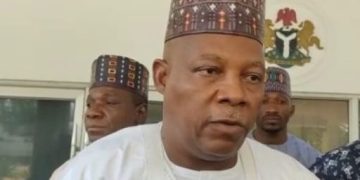President Muhammadu Buhari says the adoption of Central Bank Digital Currency (CBDC) can increase Nigeria’s Gross Domestic Product (GDP) by 29 billion dollars over the next 10 years.
Buhari made this submission on Monday while performing the formal Unveiling of Central Bank of Nigeria (CBN) Digital Currency, eNaira at the Presidential Villa, Abuja.
He said that, by the introduction of the eNaira, Nigeria had become the first country in Africa, and one of the first in the world to introduce a digital currency to its citizens.
The president said there were Nigeria-specific benefits of the digital currency that cut across different sectors of the economy.
In recent times, the use of physical cash in conducting business and making payments has been on the decline; this trend has been exacerbated by the onset of the COVID-19 pandemic and the resurgence of a new Digital Economy.
Alongside these developments, businesses, households, and other economic agents have sought for new means of making payments in the new circumstances.
The absence of a swift and effective solution to these requirements, as well as fears that central banks’ actions sometimes lead to hyperinflation created the space for non-government entities to establish new forms of private currencies that seemed to have gained popularity and acceptance across the world, including here in Nigeria.
READ ALSO: Nigeria’s Digital Currency, eNaira, Goes Live After Launch By Buhari
In response to these developments, an overwhelming majority of central banks across the world have started to consider issuing digital currencies in order to cater for businesses and households seeking faster, safer, easier and cheaper means of payments.
According to the president, a handful of countries including China, Bahamas, and Cambodia have already issued their own CBDCs.
Buhari said that a 2021 survey of central banks around the world by the Bank for International Settlements (BIS) found that almost 90 percent were actively researching the potential for CBDCs.
He said that the survey also found that 60 percent were experimenting with the technology while 14 percent were deploying pilot projects.
Needless to add, close monitoring and close supervision will be necessary in the early stages if implementation to study the effect of eNaira on the economy as a whole.
It is on the basis of this that the CBN sought and received my approval to explore issuing Nigeria’s own CBDC, named the eNaira.
This move was underpinned by the fact that the CBN has been a leading innovator in the form of money they produce, and in the payment services they deploy for efficient transactions.
They have invested heavily in creating a payment system that is ranked in the top ten in the world and certainly the best in Africa.
This payment system now provides high‐value and time‐critical payment services to financial institutions, and ultimately serves as the backbone for every electronic payment in Nigeria.
President Buhari said the apex bank had also supported several private‐sector initiatives to improve the existing payments landscape, and in turn, had created some of the world’s leading payment service providers.
















